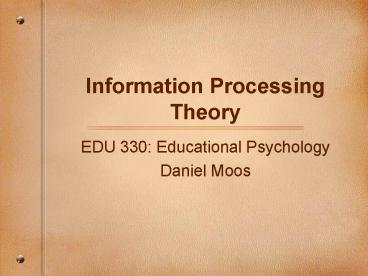Information Processing Theory - PowerPoint PPT Presentation
1 / 12
Title:
Information Processing Theory
Description:
Cognitive processes: Metacognition (I) ... Cognitive Processes: Other processes ... steps and represent content both visually and verbally to reduce cognitive load. ... – PowerPoint PPT presentation
Number of Views:31
Avg rating:3.0/5.0
Title: Information Processing Theory
1
Information Processing Theory
- EDU 330 Educational Psychology
- Daniel Moos
2
IPT A review
3
Cognitive processes Metacognition (I)
- Metacognition Thinking about our thinking
control over and awareness of our cognitive
processes - Meta-attention What might you do if you were up
late the night before class and know that you
might have trouble staying awake during class? - Metamemory What types of strategies do you use
when reading for this class? - ? Developmental differences?
4
Cognitive processes Metacognition (II)
- Total Processing Space in Working Memory
Operating Space
Storage Space
5
Cognitive ProcessesOther processes
- What are some critical processes when we process
information? - Prior knowledge Elaboration
- Activity (Active vs. Passive strategies)
- Interference forgetting
- Metacognition
6
Cognitive processes Prior domain knowledge
- In 1763 Marian and the settlements ended a
seven-year war with the Langurians and Pitoks. As
a result of this war Languia was driven out of
East Bacol. Marain would now rule Laman and other
lands that had belonged to Languia. This brought
peace to Bacolian settlements. The settlers no
longer had to fear attacks from Laman. The
Bacolians were happy to be part of Marain in
1763. Yet a dozen years later, these same people
would be fighting the for independence (Beck and
Mckeown, 1993, p.2)
In 1763 Britain and the settlements ended a
seven-year war with the French and Native
Americans. As a result of this war, the French
were driven out of North America. Britain would
now rule Canada and other lands that had belonged
to the French. This brought peace to the North
American settlements. The settlers no longer had
to fear attacks from Canada. The North Americans
were happy to be part of Britain in 1763. Yet a
dozen years later, these same people would be
fighting the for independence.
7
Cognitive processes Elaboration
- 1. You have seen a movie and you remember some
of the details exactly. Sometime later you see
the same movie again, and to your surprise some
of the dialogue and events are not as you
remembered it. Why might this happen? - 2. Three people are in a room discussing a
mutual experience. One person remembers the
event in a certain way, the second remembers it
differently, and the third remembers it in a
way that is different from either than the other
two. - How is this event similar to the first one? Why
might the three people remember the experience
differently?
8
Cognitive processes Activity
- Active vs. Passive strategies...
9
Cognitive processes Forgetting (I)
- Why do we forget information?
- Encoding is the key to retrieval
- Retrieval failure may be due to encoding
- Example State the months of the year
- Example State the months of the year
alphabetically - Why is it more difficult to state the months of
the year alphabetically? - Diversity in backgrounds influences encoding and
retrieval
10
Cognitive processes Forgetting (II)
- Why do we have trouble retrieving knowledge?
- Interference
As quickly as you can, quietly say the COLOR and
not the pronunciation of the following words
(from left to right)
Example Yellow Blue
RED BLACK BLUE BLACK YELLOW
BLACK RED YELLOW BLUE BLACK
RED BLACK BLUE BLACK YELLOW RED
YELLOW BLUE BLACK RED
11
Cognitive processes Applying IPT to the
classroom
- Begin lessons with an activity that attracts
attention. - Conduct frequent reviews to activate students
prior knowledge and check their perceptions. - Proceed in short steps and represent content both
visually and verbally to reduce cognitive load. - Help students make information meaningful and aid
encoding through organization, imagery,
elaboration, and activity. - Model and encourage metacogniton.
12
Cognitive processes Strengths and weaknesses
- What are some factors that influence the amount
you study? The amount you learn? - Which of these factors are addressed in the IPT?
Which are not addressed?































